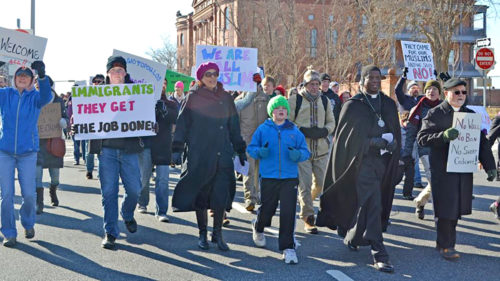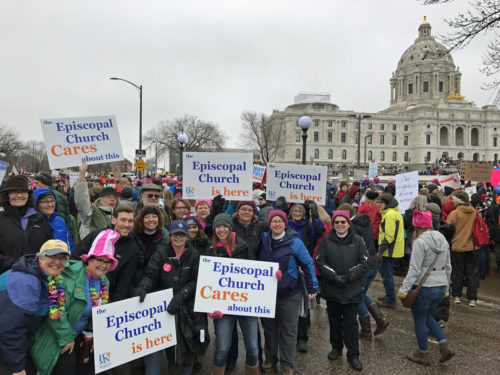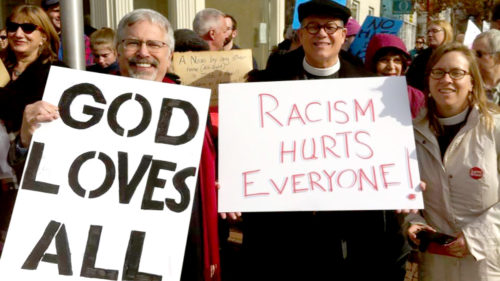Episcopalians differ on Church’s activism and mixing faith and politicsPosted Mar 9, 2017 |
|

Maryland Bishop Eugene Taylor Sutton leads a March for Refugees on Feb. 4 in Baltimore. Photo: Diocese of Maryland, via Facebook
[Episcopal News Service] Politics and religion. They’re the topics you’re not supposed to talk about, if you want to avoid a conversation filled with fireworks.
But in today’s intensely polarized political climate, where policy debates often hinge on values and on how each side views the role of government in Americans’ lives, those debates are being influenced by people speaking out as Christians, from evangelicals to Episcopalians and including Pope Francis.
Episcopal involvement in political causes and demonstrations has grown over the last eight months. Episcopalians joined millions across the country Jan. 21 for the Women’s March and related demonstrations. Several hundred joined a March for Refugees on Feb. 4 in Baltimore, one of several cities that hosted similar marches. And on March 10, Episcopal leaders will join with activists in Washington, D.C., for a march in support of the Standing Rock Sioux Tribe in its fight against a North Dakota oil pipeline that the tribe says threatens its drinking water and treaty lands.

Minnesota Episcopalians made their presence known at one of approximately 600 “Sister Marches” Jan. 21 outside the state capitol in St. Paul. Photo: LeeAnne Watkins
In more progressive Episcopal congregations, talk of a church-led “Jesus Movement” may coincide with continuing political activism. But not everyone thinks protests and other forms of activism naturally or easily flow from Jesus, church history and theology.
“A protest is a blunt instrument,” Garwood Anderson, a New Testament professor at Nashotah House Theological Seminary in Wisconsin, told Episcopal News Service. “A protest doesn’t actually encourage nuanced discourse. It encourages simplistic thinking.”
Anderson said he still thinks protests can be a worthwhile way to make common cause with others, to draw attention to issues and to satisfy our “desire not to passively acquiesce to things that we think are unjust,” and he personally is sympathetic to some of the arguments being raised nationally by recent political protests.
But he’s wary of mixing Christian teachings with political messages. It risks blurring the meaning of those teachings, Anderson said. If we as Christians indiscriminately attach to political protests, we may lose sight of “what is distinctly and uniquely Christian” about our political activism, such as Jesus’ teachings in the Sermon on the Mount and the Beatitudes.
Can protest be a righteous expression of one’s faith? On the Christian journey, is there a risk in engaging too deeply with the secular realm? How do we know when it is it appropriate to speak out in the name of Jesus? Diverse congregations across the United States are wrestling with these questions.
That diversity in the Church is part of what appeals to the Rev. Noelle York-Simmons, rector at Christ Church Alexandria.
“You can find a place that answers your spiritual and/or political and/or theological and/or social needs,” she said.
York-Simmons saw the “ethos” of her parish at work in the vestry’s decision in early February to release a statement opposing white supremacy, a response to an uproar in Alexandria after a prominent white nationalist, Richard Spencer, moved to the neighborhood and set up shop.

From left, David Hoover, William Roberts and the Rev. Heather VanDeventer represent Christ Church Alexandria at a protest Jan. 29 outside a townhouse where white nationalist Richard Spencer recently set up shop.
Some members of the congregation also have joined in peaceful demonstrations outside Spencer’s new headquarters, and the congregation occasionally has helped mobilize members to protest. Their message: “Our city and our neighborhood are not places that are going to quietly allow that kind of hatred to fester and live in our area,” York-Simmons said.
She sees this kind of activism as part of being a Christian, not contrary to it.
“If we are going to follow our baptismal vows, then we are by nature going to occasionally need to stand up against injustices that we see,” she said.
Scott Bader-Saye, professor of Christian ethics and moral theology at Seminary of the Southwest in Austin, Texas, told Episcopal News Service he tries to get students thinking about what it means to flourish as a human being created in God’s image, and he thinks “to be spiritual in the way of Jesus is to be engaged with what we think of today as political questions.”
Our answers to those questions need to be distinctively shaped by who we are as Christians, he said, and spirituality also needs to shape the means we use to work toward those ends. Bader-Saye pointed to Martin Luther King Jr.’s adherence to nonviolent protest as an example of a tactic informed by his Christian faith.
Since President Donald Trump’s election, Bader-Saye sees even more reason for Episcopalians to speak out on the issues of the day, as they and the Episcopal Church test the urgency of this moment for spiritual and political engagement.
“Right now, I feel like if a gathering of the church doesn’t feel like an act of resistance, we’re doing something wrong,” he said.
There is no shortage of examples recently of political issues taken up by the Episcopal Church: refugee resettlement, immigration, Standing Rock, health care reform – even whether the U.S. should move its embassy in Israel to Jerusalem, which the Episcopal Public Policy Network opposed in a policy alert on Feb. 14.
What Bader-Saye calls “corporate protest,” as opposed to individual Episcopalians’ political activity, is guided by the resolutions passed by General Convention. It falls to the presiding bishop, the president of the House of Deputies and Executive Council to determine how such guidance should inform the Church’s stance on the issues of the day.
In one recent example, Presiding Bishop Michael Curry and House of Deputies President the Rev. Gay Clark Jennings were the lead signers on an amicus brief filed March 2 by 1,800 clergy and religious leaders in a U.S. Supreme Court case involving transgender-bathroom use policies. The court on March 6 said it wouldn’t hear the case, a setback for the transgender teen whom Curry and Jennings were supporting.
The Rev. Michael Battle, professor of church and society at General Theological Seminary, sees recent examples of Episcopal activism as part of a profound change in the church since it first came to America in the Colonial era.
“The Episcopal Church has moved from the church of the establishment to a church of advocacy,” he said, identifying 2003 and the ordination of the church’s first gay bishop, Gene Robinson, as one key pivot point.
As the church’s perspective changes, from one of power to advocating for the powerless, Battle sees parallels with the black church as an institution serving the oppressed.
“If you’re part of the groups that are being victimized and are not in power, then there’s a whole other way of understanding church,” Battle said.
Battle was influenced by his time serving in South Africa with Archbishop Desmond Tutu in the early 1990s. Tutu was politically vocal in opposing apartheid, but Battle said he also displayed a deep Christianity that informed all he did in the public sphere.
“He always said his prayers every day. He always had habits that kept him grounded in Jesus,” he said. Battle thinks a lot of activism lacks that kind of spiritual depth, which can fuel it beyond this or that protest.
Using that spiritual depth as a source for the Church’s actions in the world is at the forefront of what Curry sees as the Jesus Movement, and he has not shied away from political and social issues. In September, he visited the site of the Standing Rock protests in North Dakota to show the Episcopal Church’s solidarity with the tribe, out of a Christian calling to stand up for human dignity and environmental justice. Episcopalians have been on the front lines of demonstrations there since August.

Presiding Bishop Michael Curry stands along North Dakota Highway 1806 on Sept. 24 to witness as law enforcement officers arrive at a small anti-Dakota Access Pipeline encampment to arrest people accused of removing no-trespass signs from neighboring ranch land recently purchased by the pipeline construction company. Photo: Mary Frances Schjonberg/Episcopal News Service
“We are always presented with issues and concerns in the public sphere. That’s life. And we who follow in the ways of Jesus must engage the public,” he said Feb. 8 in remarks to the Episcopal Church’s Executive Council. “We are an incarnational folk, which means the Word must take flesh and dwell among us. How one engages that environment, and the issues and concerns that arise, that becomes the critical question.”
“Calling us to prayer and to public witness”
Christian values also have brought depth to Bishops United Against Gun Violence, a group of 80 Episcopal bishops that has taken root and continues to pursue its mission years after it was formed in the aftermath of the December 2012 school massacre in Newtown, Connecticut, and other high-profile shootings.
The Rev. Jim Curry was bishop suffragan in the Diocese of Connecticut at the time of the Newtown shooting. He and two other bishops in the diocese wanted to do something that would invite Christians to a ministry of prayer while also bearing public witness on the issue of gun violence.

Episcopal Diocese of Washington Bishop Mariann Edgar Budde recites prayers at the first Way of the Cross station March 21, 2013, in Lafayette Square in Washington, D.C. Diocese of Connecticut Bishop Suffragan James Curry, left, and Connecticut Bishop Ian Douglas
listen. ENS photo/Mary Frances Schjonberg
They organized a Way of the Cross walk through the heart of Washington, D.C., in March 2013 during Holy Week, adding contemporary meaning to the traditional re-enactment of Jesus’ journey to Calvary and the tomb. The procession was joined by about 400 Episcopalians, including 30 bishops.
It wasn’t “confrontational protest,” Curry said, but it brought the Christian tradition of the Stations of the Cross into a public setting, to provoke “solemn reflection on gift of Jesus” as well as “the brokenness of our lives.”
“That is the place of the church, to be calling us to prayer and to public witness,” Curry, now retired, told Episcopal News Service. “And we did that through the depths of our own tradition, but with the hope that the wider community can see in that witness both hope and possibility.”
Like Battle, Jim Curry thinks the Episcopal Church was right to incorporate more advocacy in its mission, an evolution that he dates to the civil rights and antiwar movements of the 1960s and 1970s. It’s worthwhile, he said, for the church to stand as a moral leader on political questions, though that advocacy must be grounded in the faith. But, he cautioned, “It’s the responsibility of church leaders not to go so far out in front of the community that they lose sight of their responsibilities to be shepherds of the whole flock.”
Christian activism also has prompted differing opinions on how political Jesus was. Biblical and theological scholars tend to agree he was a political figure, though “politics” in Jesus’ time meant something totally different from what it means today.
“It’s sort of anachronistic to talk about protest in biblical times,” when the political systems weren’t democratic and didn’t accommodate protest like we know it today, said Bader-Saye, the Seminary of the Southwest professor. Today’s protests and political activism are intended to sway public opinion, but ultimately the goal is to influence how elected officials vote on certain bills. That kind of power structure “just didn’t exist in Jesus’ day.”
Jesus’ words and actions could be seen as political, though, he said, in how they brought him into conflict with the powers of his time, as seen in his journey into Jerusalem at the end of his life. Bader-Saye sees that journey as analogous to some of the great protest marches of our time, from the civil rights march from Selma to Montgomery in 1965 to the Women’s March this year.
“Jesus was intentionally taking his witness and his proclamation to the place that it was going to be heard by people in power,” he said.
But Anderson, the Nashotah House professor, cautions politically active Christians not to expect Jesus to provide precise spiritual justification for present-day political causes.
“Jesus as we know him in the scriptures becomes like a talisman for causes we’re already committed to,” Anderson said, but by reading socio-political implications into his teachings we may be clouding his meaning with partisan baggage.
“Sometimes Christian engagement in political affairs actually misshapes the distinctively Christian character toward our desired political ends,” he said.
‘Value-based engagement’
The presiding bishop seemed to address such concerns in his Feb. 8 comments to the Executive Council, saying that the Episcopal Church must do more than “just to become another interest group.”
“Engaging on the level of the values and the commitments that we hold dear, which are going to come from Jesus of Nazareth and our tradition as Episcopal Anglican Christians … that value-based engagement is not just an interest group,” Curry said.
Addressing the church’s activism on the issues of refugee resettlement and immigration, Curry invoked Jesus’ parable of the Good Samaritan in expanding the meaning of “love thy neighbor” and encouraging America to welcome strangers from other countries who need our help.
“You see, that’s not an issue; that’s a value. Then you engage refugees and immigration policy, not from the issue but from the values of Jesus,” he said.
York-Simmons said she personally favors even more political engagement by Episcopal congregations, but she wouldn’t expect that from all congregations. Serving the less fortunate can take a variety of forms, and more traditional congregations may carry out their baptismal covenant in their own ways.
“It’s not all going to look like a political movement,” she said. “And that’s OK.”
– David Paulsen is an editor and reporter for the Episcopal News Service. He can be reached at dpaulsen@episcopalchurch.org. Mary Frances Schjonberg contributed to this report.

Social Menu